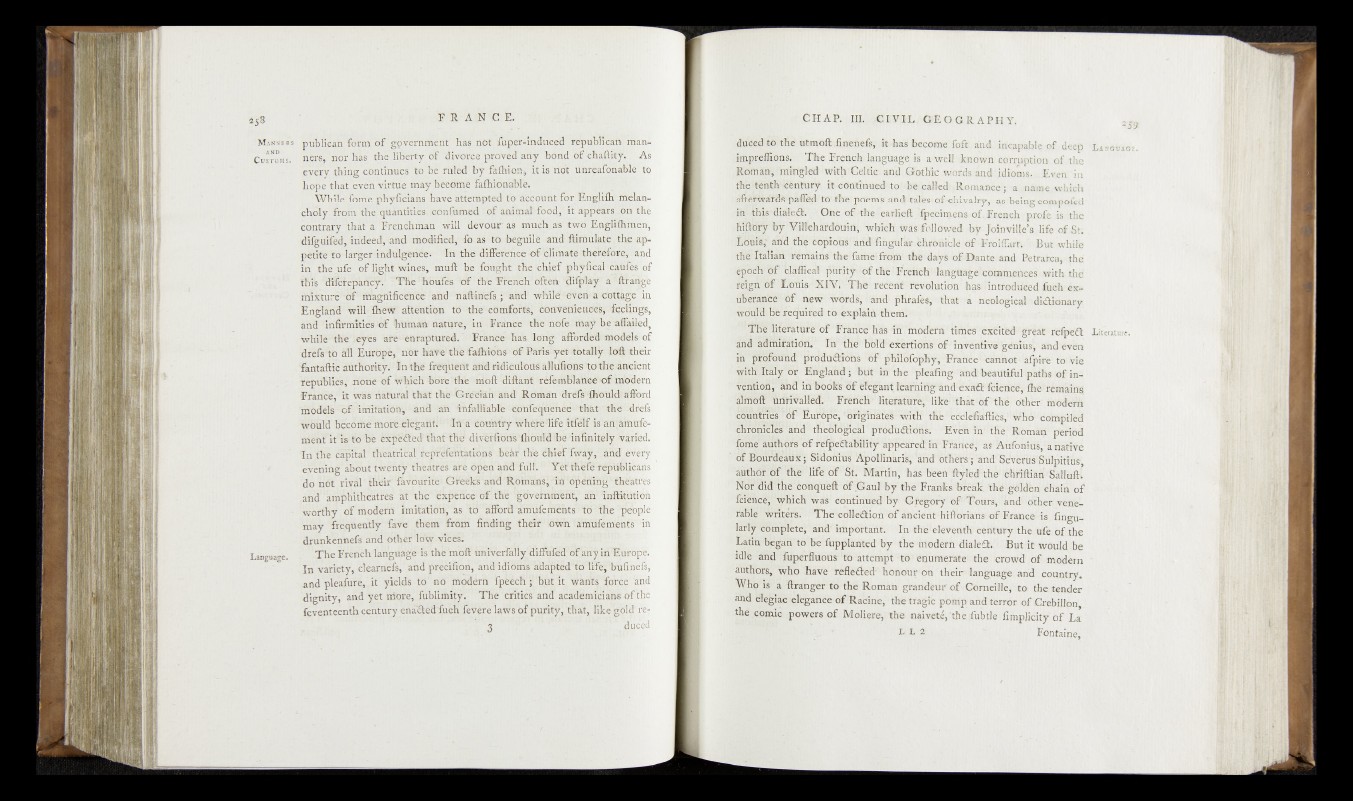
M ashks
lCilUfSlTilOSMIS
Language.
s publican form o f government has not fuper-induced republican manners,
nor has the liberty of divorce proved any bond of chafUty. As
, every thing continues to be ruled by falhion, it is not unreafonable to
I hope that even virtue may become falhionable.
’ While fome phyficians have attempted to account for Enghfli melancholy
from the quantities; Fcpnfumed of anam^lyfoodT' it âppèaf^eoef'me
contra|y~rhar^a,-fer^cfcman ‘w h l* Jl^ o u r' as ‘muchlas two
difedifêd, Irideedyand rhedified,’ ■fbvâsrkn haguilè and* Miüül«4et-ttó,,^p_
. pétite fo -1 ger-mthÿlgedier In d-iïRbêrice^^diïhatétfhèiëfor cjpand
-* in tlm ufe U r i tg l t wmès, m tM b o _foti^Ht^hq‘chi,cf j3u y iiF ^ r-c ;i^ ^ ||f
tbi’s ^dmdie’jiaif^y. ‘'T b e 'h b um s Jb¥ éhte ÿ f^ S rô ^ teS i ^ ifp 'a y â^Marsge
tViWw i^ ’-of' rf^aghificéncè| lahd ’ naftinefs ; a n d ’ # ‘Mlef';e v e î iiîp ^ ^ g e un
England' wilh’fhew' attention iëhiMleAölè^iïhèShgs,
and In frm itie 's1©? htrmaîri- fiatur^-'bn^Fxtmce Æ#^il®âk-a^'ibe*afiLik'd|
while the >êfes rife^enfàptured. Frâride’ihtè, 'affôrdè&feodels jof
:dfêfs*tb a l Eüropè, ribf havë^ïhe fa îh 'fe n s^ ^ PaîfiSKÿéeitëtally ibtflfstheir
*fâiïtafttéaitte)iity. jra the frequent and ridiêi^üS^i®W|fif^c«lf^&teïeQt
Republics, .none of wbïeKbfeibM?hfe^ôft!dïftàn1i' •rèfemHla&^ê'>ofîtardera
France,“ if wÉÉs‘^ÉfcM;thÉÉ A ^ ^ ^ â SM îS h tf Rdrtóri QîréfS1 dhôuldtpSbrd
models -©£, imitation, and an fe ^ h d b l'e '‘-^6h4tfeqfehebi,%l®L£.''t!fheHpfs
wtiuRl BêcoftemorfÜëfëgaHh Itfd country ^bèrefbfe Melf isan'afctife-
ment it is tblSfe mtÿB3:ed,m a fîR e di^î'flë^fllêftifPfffB^^rifiniéelÿ^iifed.
In the capital theatrical feprbfentatio ns b ear the chief fway, and every
evening about twenty theatres are open and full.
do not rival ' their"‘favourite* ©i^kfe^and'R o rffitï^y frrb ^ e ifih ^ ^ ï^ 'tre s
.and amphitheatres at the expence o f the 'govcrnriient, ïiP'dnfBfhtiph
- worthy.of4modéra îmitation,' as afford“âmyfemèfe.tffllffi:'TOe^tptople
mày frequently f a r e them from fhïdiri| th'èSfî;ldwIn ' arrfdfe^Kenfs" !ih
drunkennefs arid dtherfo’w V iM i r
The French language is the moft univ'érfally diffufed ó f any in Europe.
In variety, clearnëfs, and precifion, aüdidtbmpad^tód^tanife^btiffiyis,
and pleafure,,it yields tp no' frioderri fpeech ‘but i p warns 'foircg* and
dignity, and yet rfore, fubliriiity. The cf fries and academicians,of tfie
feventeenth century enaSted fuch feÿer’è laws of purity, that, like gold' [re-
3 ' I p ■ ■’" ‘v , } “ f I
duced to the utmoft.finenefs, it has become fa ff and incapable of deep bAngua
impreffions. The French language is a'well known corruption of. the
Roman, mingled with Celtic and Gothic words and idioms- Even in
the-tenth century it- continued to be, called • Ro mance. ■ a name which
afterwards palled to the poems and tales of-chivalry, as being eopipofed
in this dialect. One of the carlieft fpecimens of French profc is the
hi (lory by Yillehardouin; which was followed by Joinville’s life of St.
Louis," and the copious and Angular chronicle of Froiflk’rt: 1 But while
tWjMridrl«'it^m'ainkthe‘ fameJfrdkir th i ’dalfkof ©anCe and Betfahea, th e
epocm^bf5 bla^^(E•#^pufit^ldf th e !F*reiie'h'14ang{fegelcor»m1erf£es with the!
Mgnbof' ’ rsMbrit:'’rfeVohltmir has;, introdtsfced -fa^h exrifev^
iy4 rds', ^abcp p ifk fg ^ rtfew b l nettls^ietd-Sdhftionaty
wtlmd' be required t-b^explaln 'thenil'’' -
. /» ,C$. atj * o f”Efk'n'ce'Ms ^bnodferh-'’ timfes dxbifed^grfat relpebt Literatur
and admiration. In w lftl,d*)eibrfidri?s' of1- inventive ^grinihs^ and even
i n ’pTofeund 'prdfuia#M'l- t-of y ^ b fo p fiy , Ffah^’e^cannat* afpirfe' to-vie
ivitl^FralVfe^ Eri'gkh'd ■; but in ^ h e ' 'pfeafirig andhbfeabfciful paths -of in-
V ^ to n ,- and €?eganf le^^biifg‘'hnd'e
almoft' nfmwaHedt1;f f’erfc®*’1 literaflrie^Mike1 th a t'd f^ h ^ ' dffierr moddfri
CQua^^ s j ffl'E u ro p e ; *S^gtriafes with thfe- leftllSfi^hics,5'v^ho!fCQTripil’ed
chronrdles1'’arid^tpeST^fcp pfdtfh£H'diis;( Evbri-fo/tfte Roma^- period
vfome, authofs'-of rd^eftabilrty''a'p|)b&ea;iris F fin ce ',''as%dfdMmS,)a native
of Bburdeaiix"; SiuonruS Apoltinaris, andfnfhe¥s'; 'andf'Sdverus(Sulpitins,
author "off ^the ‘life 0!f ; Sf.u Martin, has heferi flylfed thAf ^hriftiari'hstluftl
^ r u i d th'dmcfnq'treft d f ,Gati@by the Franks break ‘Ch'e-gbldhn chain of
IciMte'r which wais' continued‘by- Gregory b ffi’Tours,-,and' ^either vene-
Jwfiters. I 'The 'co'lleCtioh^&ralicrent1 h iftoriaris' dfiFsTiiiEGe ds fingu-
lifly comidete, and iriiportarit. In th e ’eleventh cebtriryathe ufeioflthe
Latin'btegari t6 be fupplanted by the rtloderh d ia te a.’» B u t;it wduld be
fdlfe arid ftlpdrSdorife^fe-attempt to^»enumerate*, the ‘crowd o f modern '
authors, 'who ’Have refledteck horib'ufmn ^theihi -1 anguage, and country,
Whb is a ftranger to the Roman grandeur*of, Corneille, ,to the. tender
arid elegiac elegance o f Racine, the tragic pomp and terror o f .Crebihpn,
the .comic powers o f Molieref'the naivete, 'the.jfubtle ■ fimplicity 6 f La
L l 2 s&b Fonlainej
GE.